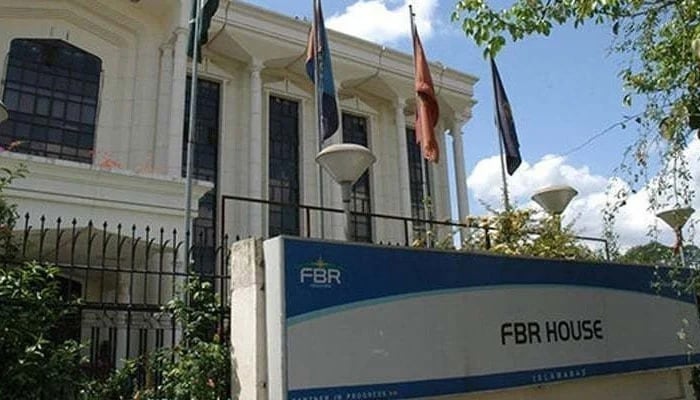Properties’ DC rates not to be less than 85pc of FBR valuation
FBR has concluded a signed written agreement with all four provinces on immovable property valuation tables
ISLAMABAD: The World Bank (WB) and Pakistan have revised the timeframe and Disbursement Linked Indicators (DLI) under $400 million loan of Pakistan Raises Revenue (PRR) including jacking up tax-to-GDP ratio from 8.5 to 8.8 percent and digital data sharing with all provinces.
Under the DLI of the WB loan, the FBR is bound to sign a Memorandum of Understanding (MoU) on automated data sharing with all four provinces for preparing a unified taxpayers’ database. The signed loan document clearly states that the functionality of digital data sharing among the FBR and provinces will be verified by the Independent Verification Agent (IVA). “The FBR has concluded a signed written agreement with all four provinces on immovable property valuation tables” the WB’s project titled “Pakistan Raises Revenues” states making it crystal clear that the revised valuation of property tables would be implemented from the next fiscal year.
The FBR also agreed with the provinces that the DC rates notified by the provinces would be around 85 percent of the rate determined and notified by the FBR. The FBR plans to implement the revised upward valuation tables of properties with effect from July 1, 2024.
The WB’s PRR project time frame has been extended from June 2024 to June 2025. Under the revised framework of PRR between WB and the Economic Affairs Division (EAD), the FBR’s total collection as a percentage of GDP will be increased from 8.5 percent of GDP in FY2023 to 8.8 percent of GDP in FY2025 to enhance the attribution and better capture implementation agency’s efforts.
The indicator on Doing Business has also changed because the report is no longer published by the WB so the methodology to measure progress on this indicator has changed from Doing Business Report to using a case study approach to capture progress.
The hours spent for customs clearance at the borders have been revised to use real-time data on goods declarations cleared in 48 hours or two working days. This indicator name also changed to “Efficiency in Customs Clearance of Key Exports and Imports.”
The sources said that the FBR also signed with the provinces on a method for General Sales Tax (GST) input adjustments and systematic, regular, and digital data sharing system with all provinces including validation and accuracy and reliability of data. The FBR has harmonized the definition of economic transactions related to GST and GST on Services (GSTS) with all provinces. The GST on goods is the domain of the Center under the Constitution while the GST on services is the responsibility of the provinces.
The FBR has to prepare an MoU and agreement on GST input adjustments which would have to be endorsed by the Ministry of Finance with the support from the Ministry of Inter-Provincial Coordination (IPC). The agreements between the FBR and the provinces will be verified by the FBR task team based on official documents. However, the WB will conduct a review of the MoU with the provinces.
-
 Timothee Chalamet Shares Major Learnings After Working With 'favourite' Director Christopher Nolan
Timothee Chalamet Shares Major Learnings After Working With 'favourite' Director Christopher Nolan -
 Timothee Chalamet Heaps Praise For Matthew McConaughey's Work In Super Hit Project 'Interstellar'
Timothee Chalamet Heaps Praise For Matthew McConaughey's Work In Super Hit Project 'Interstellar' -
 British MPs Pass A Motion Due To Andrew: ‘Lets Remove The Bandages From Our Mouths
British MPs Pass A Motion Due To Andrew: ‘Lets Remove The Bandages From Our Mouths -
 Prince Edward Forced To Skip Royal Engagement With King Charles
Prince Edward Forced To Skip Royal Engagement With King Charles -
 Sharon Osbourne Says Ozzy Osbourne 'knew' He Could Die Ahead Of Last Black Sabbath Show
Sharon Osbourne Says Ozzy Osbourne 'knew' He Could Die Ahead Of Last Black Sabbath Show -
 Telegram Co-founder Pavel Durov Under Investigation: Russian State Media
Telegram Co-founder Pavel Durov Under Investigation: Russian State Media -
 Ethan Hawke On Regrets He Had Related To Daughter Maya Hawke: 'Really, Really Hard'
Ethan Hawke On Regrets He Had Related To Daughter Maya Hawke: 'Really, Really Hard' -
 Here's What 'Lizzie McGuire' Alum Jake Thomas Said About On Screen Dad Robert Carradine Ahead Of Death
Here's What 'Lizzie McGuire' Alum Jake Thomas Said About On Screen Dad Robert Carradine Ahead Of Death -
 Nvidia Earnings Face AI Boom Test Amid Intensifying Market Competition
Nvidia Earnings Face AI Boom Test Amid Intensifying Market Competition -
 UK Government Sign Off On Releasing Confidential Documents About Andrew: Here’s Why Now
UK Government Sign Off On Releasing Confidential Documents About Andrew: Here’s Why Now -
 David Bowie's Daughter Alexandria Lexi Jones Recalls Painful Childhood Trauma: 'That Is Abuse'
David Bowie's Daughter Alexandria Lexi Jones Recalls Painful Childhood Trauma: 'That Is Abuse' -
 Prince Harry Speaks Directly To Ukraine In An Emotional Statement: Watch
Prince Harry Speaks Directly To Ukraine In An Emotional Statement: Watch -
 Kelly Clarkson Gushes About 'The Voice' Contestants' Sweet 'gift': 'You Are My Favorite'
Kelly Clarkson Gushes About 'The Voice' Contestants' Sweet 'gift': 'You Are My Favorite' -
 Kelly Clarkson Recalls Facing Prejudice From Music Execs After Winning 'American Idol' In 2002
Kelly Clarkson Recalls Facing Prejudice From Music Execs After Winning 'American Idol' In 2002 -
 Demi Lovato Thought She Was 'maxed Out On Love' For Jordan 'Jutes' Lutes On Wedding Day
Demi Lovato Thought She Was 'maxed Out On Love' For Jordan 'Jutes' Lutes On Wedding Day -
 Director Of UK Airline Parts Firm Jailed Over $9m Fraud
Director Of UK Airline Parts Firm Jailed Over $9m Fraud




